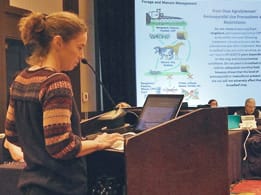by Linley Dixon, PhD
 |
A clear message that The Cornucopia Institute, and other organic stakeholders, are pushing the NOSB to act more conservatively was evident in the votes to remove three 2016 sunset toxic boiler additives: cyclohexylamine, diethylaminoethanol, and octadecylamine. The NOSB also voted to reject the petition to add PGME as a synthetic boiler additive, based on comments provided by Cornucopia staff at the previous meeting.
The petition to add whole algal flour (used as a partial replacement for cream, milk, eggs, and/or butter in vegan products) and the petition to add triethyl citrate (for use as a whipping enhancer for egg whites) were both voted down, based on lack of essentiality.
All newly petitioned crops materials failed to be added to the National List, including exhaust gas for gopher control, calcium sulfate (gypsum from flue gas desulfurization) for use as a soil amendment, and 3-decene-2-one for use as a potato sprout inhibitor.
Non-organic glycerin was removed from §205.605(b) (synthetic materials for food processing) and substituted on §205.606 instead requiring the use of organically produced glycerin (produced by the process of microbial fermentation) as long as it is commercially available.
The only newly petitioned substances to be voted on to the National List were livestock materials: acidified sodium chlorite (for use as a teat dip for dairy cows) and zinc sulfate (for use as a foot bath for cattle).
2016 sunset materials that were voted to remain on the National List included L-malic acid, microorganisms, activated charcoal, peracetic acid, sodium acid pyrophosphate, ferric phosphate, and hydrogen chloride.
2016 sunset materials that were voted off the National List included egg white lysozyme, which Cornucopia testified against, and tetrasodium pyrophosphate.
The allotted maximum amount of synthetic methionine for use in poultry production was voted to be averaged over the life of the bird, providing a loophole to increase its use. A resolution that the NOSB is committed to the phase-out of synthetic methionine was subsequently passed.
This story was previously published in the Summer 2015 Cultivator, Cornucopia’s quarterly newsletter.

